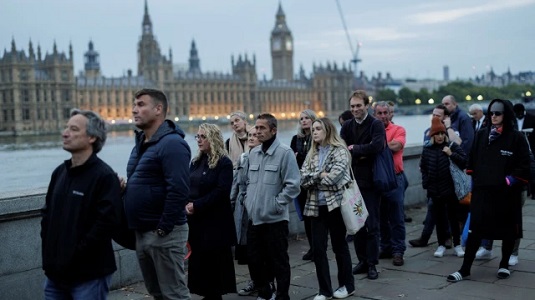
The Queue affirms what we already know: that millions are enthusiastic about royalty, and are drawn irresistibly to monarchical spectaculars like pilgrims to shrines, and understanding this doesn't rely on much abstraction or high theory - often it's a case of listening to people talking about their personal relationships with royalty.
As noted here many times, celebrity is at once near and distant, a juxtaposition of the familiar and the unknown. After the Church, monarchies were the first institutions to build these concrete-but-abstract relationships, and The Queue embodies this tension. In life, no British monarch has met as many of their subjects, with some estimating figures of around 15 million people. For many of those, they have a piece of the Queen that is uniquely theirs. Metres away and insensible to the flows of humanity gushing by her coffin, in death The Queue reaffirms and renews this individuated fealty. Listening to the stories, meeting the Queen when one was a school girl, the Queen as a stable background presence, the Queen as an inspiration during military service, the Queen as a symbol of a simpler past, and the Queen as a projection of what is good about our national community, The Queue is less a clearing house and more a chorus of intention, a hymn to an essentialised unity bringing together us Brits and everyone who wishes us well.
The Queue draws out the motivations for being there, arranging them in one direction and with one overriding goal - a multitude gladly shuffling along to subsume their singularity into a collective of one: a supra, semi-mystical sovereign body of duty, national community, and kindness. In the absence of other strong sources of collective knowing and feeling, the monarchy and the nation are almost the natural repository for such longing. It's therefore not surprising that the diminution of the individual before the awe many say they felt as they walked by the coffin has provoked a strange egalitarianism, albeit a negative one in which inferiority is internalised and recognised in others and affirmed by participating in this spectacular procession. The backlash against VIP queue jumpers is because they violate the spirit and disrupt the doxa these hours' long devotionals are sustaining.
Politically speaking, The Queue is a triumph. Not for Liz Truss or any political party. The Queen was above party politics, after all. But it shows that not only does the British state retain legitimacy for plenty of people, perhaps even more want it to have legitimacy. Their desire is for a higher power that will make sure everything is alright, a reassuring presence that ensures continuity and an everyday sense of security, peace, and fairness. Far from being imperilled, if the ruling class and their political satraps play their cards right their power and privilege is as secure as it ever was. The usual Tory V Labour knockabout will resume after the funeral, but the core, anti-democratic institutions of state are fine. And if they're doing okay, if the hereditary principle still has mass purchase, a challenge to the lynchpin of their power - capital, property, and the wage relation - remains a far away prospect.
Image Credit
7 comments:
As an antidote to all this, Andy Beckett's (who is always brilliant) excellent analysis of this whole period in his latest Guardian piece is well worth a read.
...Also the (also excellent) David Edgerton has a Guardian piece on the monarchy and the Conservative party - very well worth reading.
“The Queue is …. a hymn to an essentialised unity bringing together us Brits”. – complete tosh.
You seem to have swallowed the establishment lie that the country has been united in a common belief and purpose during the last 10 days.
The purpose of this lie is to cement the current constitutional arrangement and transfer the ex-Queen’s glamour to Charles, and to stop at all costs any discussion about the role of the monarchy present and all it represents.
The coverage of the queue and the interviews with those in it was a deliberate attempt to pretend there is national unity despite, even in the face of the media blitz, many still oppose or are indifferent to the role of the monarchy and the soap opera that comprised the Queen’s role.
The only reason the Queen was above party politics is because hardly anybody in the Labour Party is willing to argue against the current constitutional settlement. It says more about the political bankruptcy of the Labour Party than the role of the monarchy.
The last 10 days reminds me of the film The Death of Stalin with the peasants swarming to the capital – “we want to see Uncle Joe because he loved us”
I guess Graham is unfamiliar with common rhetorical devices, such as giving voice and personality to an observable phenomenon.
True.
I lost my sense of humour a few days into this bilge fest.
Katherine Bennett in the Observer was very entertaining, imagining the rage and frustration of Johnson at being denied the opportunity to take centre stage, make a big "Churchillian" speech, etc, etc.
A tad Anglo-centric. Celtic and Dundee games not on message.
Look up Celtic Fans’ Response to Queen.. on YouTube. I can’t post the link, but a minutes’ applause was met with,
“If you hate the royal family clap your hands”
Post a Comment